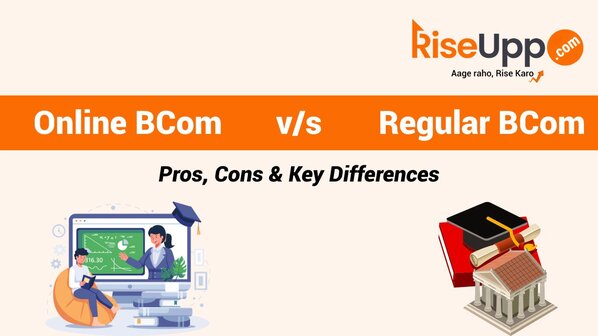Online BCom vs Regular BCom: Pros, Cons & Key Differences

The Bachelor of Commerce (BCom) degree continues to be one of the most popular undergraduate choices for students in India. With its wide-ranging applications in fields like finance, accounting, taxation, and business management, BCom serves as a foundational step for countless careers.
Over the past few years, the rise of Online BCom programs has opened new doors for students who prefer the flexibility of digital learning. Whether you're a working professional, a student living in a remote area, or someone looking to balance studies with other commitments, Online BCom has emerged as a viable alternative to the traditional classroom format.
What is a Regular BCom ?
A Regular BCom refers to the traditional, campus-based 3-year undergraduate program offered by universities across India. It involves daily college attendance, face-to-face interaction with faculty and peers, and a structured academic schedule.
Typical features of a Regular BCom:
- Classroom-based learning with a fixed timetable
- Semester-based exams conducted on-campus
- In-person access to college facilities like libraries, seminars, and student activities
- Active participation in college fests, cultural events, and student clubs
Examples of top universities offering Regular BCom:
- University of Delhi (DU)
- Mumbai University
- Christ University, Bangalore
- Loyola College, Chennai
What is an Online BCom?
An Online BCom is a fully digital version of the BCom program, offered by UGC-DEB-approved universities. These programs are conducted through Learning Management Systems (LMS) that host recorded lectures, live sessions, quizzes, and assignments.
Key features of Online BCom:
- 100% online curriculum with digital exams
- Flexible learning schedules—ideal for part-time or full-time professionals
- Access to recorded classes, eBooks, webinars, and discussion forums
- Support through virtual doubt-clearing sessions and peer learning groups
Leading universities offering Online BCom:
- Jain University
- Amity University
- Manipal University Jaipur
- Chandigarh University
Key Differences: Online BCom vs Regular BCom
| Factor | Online BCom | Regular BCom |
|---|---|---|
| Mode of Learning | 100% Online (LMS, live classes) | In-person classroom |
| Flexibility | High – Self-paced learning | Fixed schedule with daily attendance |
| Interaction | Virtual sessions, discussion forums | Direct interaction with faculty & peers |
| Fees | Generally lower (INR 30,000–1.5 Lakhs) | Can be higher in private colleges |
| Accessibility | Study from anywhere | Location-bound to campus |
| Validity | UGC-approved and fully recognized | Fully recognized by UGC |
| Ideal for | Working professionals, remote learners | Students who want campus life |
Pros and Cons of Online BCom
Pros:
- Study at your own pace, from any location
- Opportunity to work part-time or do internships alongside
- Lower cost compared to private colleges
- Access to digital resources, recorded lectures, and virtual mentors
Cons:
- Limited in-person interaction with peers and faculty
- Requires strong self-discipline and time management
- May not offer the same campus placement opportunities
Pros and Cons of Regular BCom
Pros:
- Campus exposure with fests, seminars, and extracurriculars
- Direct networking with peers, faculty, and alumni
- Traditional brand value and structured academic discipline
Cons:
- Rigid schedule may not suit working students
- Higher tuition and accommodation expenses in metro cities
- Limited flexibility in learning pace
Online B.Com Programs – Universities, Fees & Specializations
Who Should Choose What?
Choose Online BCom if:
- You are working or pursuing internships alongside your studies
- You need the freedom to study from home or while traveling
- You want to upskill in areas like digital marketing, data analytics, or finance using additional certifications
Choose Regular BCom if:
- You want the full college experience with on-campus life
- You thrive in classroom environments with direct mentorship
- You live near a reputed university or are willing to relocate
Final Verdict
Both Online BCom and Regular BCom formats offer UGC-recognized degrees that are equally valid in the eyes of employers and higher education institutions. The choice between the two should depend on your personal learning preferences, availability, financial situation, and career goals.
At the end of the day, success in the commerce field hinges more on the skills you acquire, the internships you pursue, and the certifications you add to your portfolio—rather than the mode of your degree.
Need Help Deciding?
Still confused between Online and Regular BCom? Let the experts at RiseUpp help you make the right choice. Get personalized career counseling, compare top online universities, and plan your academic journey with ease.